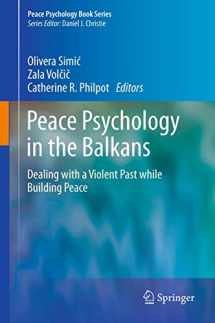
Peace Psychology in the Balkans: Dealing with a Violent Past while Building Peace (Peace Psychology Book Series)
ISBN-13:
9781461419471
ISBN-10:
1461419476
Edition:
2012
Author:
Olivera Simic, Zala Volcic, Catherine R. Philpot
Publication date:
2012
Publisher:
Springer
Format:
Hardcover
264 pages
FREE US shipping
on ALL non-marketplace orders
Rent
35 days
Due Jun 12, 2024
35 days
from $79.78
USD
Marketplace
from $111.09
USD
Marketplace offers
Seller
Condition
Note
Seller
Condition
Used - Good
Book details
ISBN-13:
9781461419471
ISBN-10:
1461419476
Edition:
2012
Author:
Olivera Simic, Zala Volcic, Catherine R. Philpot
Publication date:
2012
Publisher:
Springer
Format:
Hardcover
264 pages
Summary
Peace Psychology in the Balkans: Dealing with a Violent Past while Building Peace (Peace Psychology Book Series) (ISBN-13: 9781461419471 and ISBN-10: 1461419476), written by authors
Olivera Simic, Zala Volcic, Catherine R. Philpot, was published by Springer in 2012.
With an overall rating of 4.2 stars, it's a notable title among other
Environmental Economics
(Economics, Economics, International Business, Personality, Psychology & Counseling, Social Psychology & Interactions, Social Psychology & Interactions, Psychology) books. You can easily purchase or rent Peace Psychology in the Balkans: Dealing with a Violent Past while Building Peace (Peace Psychology Book Series) (Hardcover) from BooksRun,
along with many other new and used
Environmental Economics
books
and textbooks.
And, if you're looking to sell your copy, our current buyback offer is $0.3.
Description
The volume covers the development of peace psychology in the Balkans. The Balkans is a region marked by post-communist and post-conflict transitional turmoil, and this book provides a comprehensive introduction to research in peace psychology in this part of the world, written by scholars primarily working in the Balkan area. It brings together innovative scholarship that examines interdisciplinary aspects of peace psychology researched and written by scholars from Kosovo, Serbia, Bosnia, Bulgaria, Romania, Macedonia, Croatia, and Slovenia as well as presenting research that responds to contemporary global issues by tracking the ways in which peace psychology is developing and implementing in the Balkans.


We would LOVE it if you could help us and other readers by reviewing the book
Book review

Congratulations! We have received your book review.
{user}
{createdAt}
by {truncated_author}


